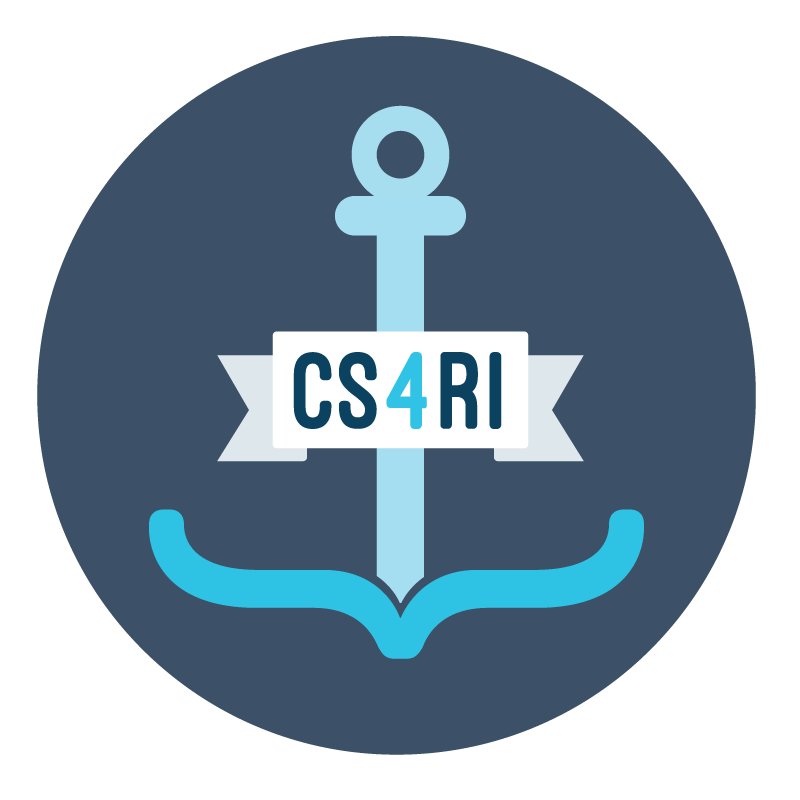RI-CSE Self-Paced Learning Module
For ICDS and/or CS Endorsed Teachers
This module is intended for RI teachers who have already completed URI’s Intro to Computing & Data Science course (ICDS) PD and/or RIDE CS endorsed teachers who are not new to teaching computer science.
The module consists of 6 parts and is estimated to take 6 hours to complete. Upon successful completion and submission of all 6 parts, teachers will receive a certificate of completion via email indicating the estimated PD hours.
Part 1: Overview (60 minutes)
Watch: RI-CSE Overview for ICDS/CS Endorsed Teachers [33:02 min]
Respond to the following question prompts:
Reflect on the structure and content of the RI-CSE course, particularly in terms of its suitability for students with varying levels of prior computer science knowledge. How would you use the RI-CSE curriculum to differentiate your instruction to meet the needs of students with different levels of experience in the subject?
Review the unplugged activities in the lesson plans. What types of successes and challenges might you face when implementing these in the classroom? (provide at least two examples)
Review the CS Practices mentioned in the video. How will you incorporate these practices in your classroom? Describe how these practices may benefit your students.
Part 2: AI Image Generation (45 minutes)
Watch: How AI Works: Creativity & Imagination [5:18 min]
Complete: L04 Activity Guide - Part 3 ONLY (AI Generated Bitmoji)
Respond to the following question prompts:
Provide a shareable link to your completed Part 3: AI Generated Bitmoji activity guide document.
How will you guide students in revising their prompts to ensure that the resulting AI generated image more accurately represents their intended self-image, particularly if the initial images do not meet their expectations?
Part 3: Keys to Cybersecurity (30 minutes)
Complete: L09 Activity Guide - Part 1 ONLY (Online Threats & Vulnerabilities)
Respond to the following question prompts:
Provide a shareable link to your completed Part 1: Online Threats & Vulnerabilities activity guide document.
Cyber.org’s “Cybersecurity Key” modules are self-paced learning modules for students. How will you implement these modules in your classroom to ensure learning objectives are met for all students?
Part 4: Mobile App Development (90 minutes)
Review the Thunkable Documentation optional resource provided in the lesson plan.
Complete: L10 Activity Guide - Parts 1 & 2 ONLY (Catch Phrase)
Respond to the following question prompts:
Provide a shareable link to your completed Part 1 & 2: Catch Phrase activity guide document.
How might you use the Thunkable Documentation to teach and assess CS Practices #2 (Collaborating Around Computing) and #6 (Testing & Refining/Debugging)?
Which other CS Practices may be useful in supporting students throughout this lesson? (provide at least one example)
Part 5: Responsible Computing in Society (90 minutes)
Follow the Code.org lesson: Chatbots and Large Language Models (including watching videos and doing the Written Voice Simulator activity).
Follow the Code.org lesson: Algorithmic Bias (including watching videos and doing the Cropping Widget activity).
Respond to the following question prompts:
What is a large language model?
LLMs are learning from every word on the internet. What is a benefit of using the entire Internet as input? What is a drawback?
What is algorithmic bias? Provide an example of bias in the data collection process.
What impact does algorithmic bias have on society? What can be done to improve this?
Part 6: Data is Everywhere! (45 minutes)
Thoroughly read through youcubed.org's Data is Everywhere Unit, then respond to the question prompts below.
Respond to the following question prompts:
What teaching strategies might you employ from the Data is Everywhere Unit to guide students through the data lessons and ensure they understand the concept of data visualizations?
How might you help reinforce the important data science principles of exploration, pattern seeking, and personal relevance throughout the data lessons in the RI-CSE course? For example, data visualizations to represent cybersecurity data.













